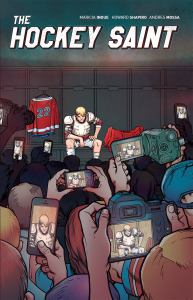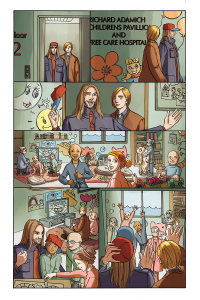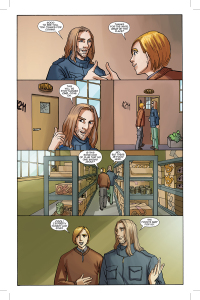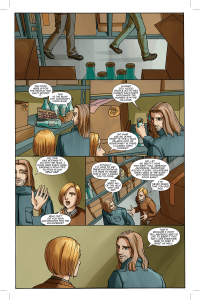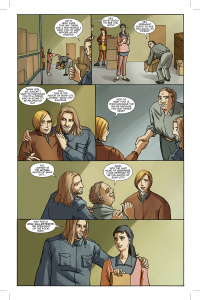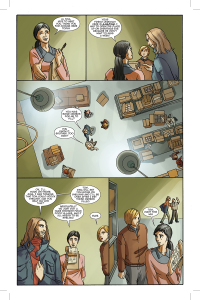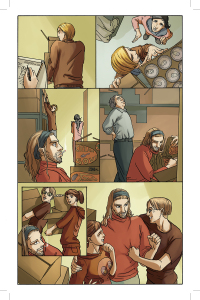It’s been 20 years since I last picked up a comic book. I was always a Superman fan from day one. I grew up watching the reruns of George Reeves playing Superman back in the 1950s. Christopher Reeve (a New York Rangers fan) dominated my childhood idea of Superman.
Superman embodied the definition of what a superhero meant to me.
For others, they grew up with Batman, Spiderman, Wonder Woman or even Wolverine as their superheroes. These were the comic book characters we marveled at from our childhood and on into our adult years as many of them hit the big screen.
In the hockey realm, for fans of the game, heroes take on a new definition.
Hockey stars begin to embody the image of what people consider heroes. It’s not what they do off the ice, it’s what they do on the ice that make people believe they are heroes. They didn’t save the world from an alien race. They didn’t run into a burning building and pull out a family and their pet dog from a fire. They didn’t create world peace. They didn’t take a bullet in order to create change to help humanity. They didn’t save anyone’s life on the ice.
No, all they did was take to the ice, perform some feat for their team, and then they became superheroes to the fans that witnessed it. One guy gets out of line, another one comes along and starts an epic fight to get the fans out of their seats. Another guy scores the winning goal, and the team celebrates their victory. At the end of the season, one team thrusts the trophy skyward and plants a kiss on it. This is their day of victory after winning one battle after the other to become victorious over the other 29 teams in the league.
Off the ice, some live the bad boy life. Others spend time in hospitals sitting next to sick children. Some people live both of those lives.
Tackling the topic of the hockey superhero is Howard Shapiro in his new graphic novel “The Hockey Saint.”
- There are a few lessons you are trying to teach both hockey players (especially young ones) and fans. How did you come to decide on these topics?
I’ve always believed that the game of hockey can teach anyone who participates and plays it very valuable life lessons. It taught me so much in the short time that I played it, just three years in high school. However, those lessons that I learned back then such as: teamwork, working as hard as possible, take nothing for granted and also the realization that nothing is given to you, nor can success be achieved without a full effort. So, I tried to work those in as best as I could and hope that the both groups, the hockey players and the fans, can pick up on them. The game gave me so much and I was a terrible, terrible player but I learned so much and the game gave so much to me that there is no way I could ever repay it. My hope is that by doing the hockey books that that in some small way gives back to the game that gave me so much.
- One of the lessons is about hero worship. Can you elaborate more on why fans should not worship hockey players as heroes?
It’s a good question and one that both sides of the issues, the side that says fans should not worship athletes and the side that does, both have their heels dug in. I just think that it’s not only naive to worship any athlete, but ultimately your going to be let down. Somewhere along the way the athlete will do something in the public domain that will be considered wrong and the thing is, deep down, that they are no different than you or me and to put them up on this invisible pedestal is a recipe for disaster, I feel. By the same token, I don’t think the athlete should be judged a “good guy” or a “bad guy” if they sign an autograph or show up at an off ice event and do something good or bad. We so often hear about an athlete who signs autographs or does something “in the community” and suddenly they are dubbed a good guy and someone to look up to. Conversely, if word gets around that an athlete is nasty to the fans or the media or they say something inappropriate they get labeled a bad guy or a locker room cancer. The truth is probably somewhere in the middle, but to me, the bottom line is don’t worship any athlete when there are so many people who would appreciate and be happy that someone was looking up to them. People such as police, fire or any first responder (male or female), soldiers, doctors or someone like Malala Yousafazi who I mention in the book.
- As a child, you learned early on why people should not worship players as heroes. Can you tell the story behind your own life lesson? What is the ultimate lesson you are trying to teach the reader?
Something that has always stuck with me was meeting George Ferguson and Dave “The Hammer” Schultz when I was twelve or so. They were playing at the time for the Penguins and the team had them come out to a bank in my neighborhood and my dad took my friend Larry Nicolazzo and I to meet them and get their autograph. I was mainly there to see George Ferguson who was one of my first hockey heroes (Darryl Sittler, Jean Pronovost and Bobby Hull were the others) and I was so excited to meet him. As the line thinned a bit I looked and saw an ashtray full of cigarette butts and I noticed that Ferguson was smoking a cigarette and in my 12 year old mind at the time, this was devastating! I felt so let down and this [may] sound very naive and trite these days but back then and at the age I was, I felt let down. It got worse as we finally got to the front of the line and got our autograph. I gathered myself up a bit and told Ferguson what I had been practicing all day “Mr. Ferguson, the goal you scored against the Sabres to win the playoff series was the best goal I have ever seen in my life!” He looked at me and mumbled something which was indecipherable through the cigarette and then slid the black and white 5 x 7 photo to me. Meanwhile, Dave Schultz, who my friend Larry and I thought would be this big and mean ogre, could not have been nicer! He asked us about where we went to school, what we wanted to be when we were older, etc. etc. He was so nice and spoke to us and looked us in the eye, it was something very nice and special to me. As we were leaving, my dad could tell I was down in the dumps and he put his arm around me and uttered that line that a father says to his kid upon meeting most athletes or celebs… “Sometimes it’s best if we don’t meet our heroes.” So, that was quite a learning experience and in addition to learning not to worship an athlete, I also learned not to judge a book by its cover and those are two of the things I hope that readers will ultimately get from reading the book.
- There are not too many graphic novels (“GN”) about hockey in existence. Why did you decide to create a graphic novel about hockey?
Exactly, I think there is only one other GN and that is Essex County Part Two by the great Jeff Lemire. So, the thought of doing a hockey-themed/related GN really appealed to me on that level as well as getting back to writing another hockey book! My last one (“Hockey Player For Life”) came out in 2008 and I have built up a bit of a following and made many great contacts in the industry (so to speak) so its been great to be able to get back to doing a hockey book! And again, I think there are so many stories that can be told about the game and its effect on the people who play and watch it.
- Did you model the main character after someone? He reminds me a lot of a player I covered.
Well, Jake (Jeremiah Jacobson), he is based on a number of different people such as Arthur Ashe, Bob Dylan, Bruce Springsteen as well as him being the anti-Sidney Crosby and also having a Gretzky/Lemiuex/Jordan-amount of out of this world talent and being the best player in the game. Light years better then the next best player. So, I wanted to give him a combination of traits and not be a sort of one note-type character. That is one of the things I really love to do when I create a character is get the reader to think that they are going one way and then completely change things up. To me, it’s like mostly everyone, we all have different sides and shades to our personality and the way we treat one another. I like to reflect that in the characters I create.
- The work the player does off the ice are examples of things that should be talked about more in the media, but aren’t (mainly for fear that their good deeds will be used against them if they’re having a bad day out on the ice). Do you think he’s right about keeping his charitable work quiet, instead of talking about it more and inspiring others to do the same?
It’s an interesting question and one that I ran through over and over when writing the book. I think that he (Jake) thinks he’s right for not talking about the charitable work because in his mind it’s not charity if you have to tell someone about it. In his position as a world class athlete, that kind of thing gets amplified a million percent over so he doesn’t feel that it is right to seem like he’s bragging if he talks about it. Plus, he only volunteers once a week and he feels that the people who volunteer more aren’t doing it for the recognition or the applause of others and he wants to fit in with them. So, I guess to answer the question, he thinks it right not to talk about it but I personally don’t agree with that. I think that the mere fact that he was doing the work would inspire others, especially younger kids, to become aware of the problems that are out there like hunger and he (Jake) would bring awareness to the problem and in some small way that may help the problem, one day, get solved.
- “The Hockey Saint” really made me think about the different stories and hockey players I’ve encountered over the years. In the end, does it seem like fame and money is all it’s cracked up to be? There’s being there for the love of the game, and then what happens when fame/money comes into the game. It seems like your hockey star didn’t like what came with his love of the game.
Well, you’re spot on in that Jake didn’t like everything that came with being the best hockey player in the world. He says how he loves the game but wasn’t prepared to be the voice of the sport or an ambassador for it, etc. He doesn’t feel comfortable in that role and he really repels from it because he feels that the fans and media want him to be those things and he’s not comfortable being someone he is not. In the book he never talks about money and he hates the fame part of the equation so overall, yes, to Jake the fame and money is not all it’s cracked up to be.
- What’s great about your graphic novel that it really makes the reader think about their own feelings and reactions towards hockey players and the game. You touch on a subject that not too many people do: respect the player for what he’s accomplished on the ice, don’t worship them; be inspired by the people that make humanity better. What are you going to come up with next?
Thanks so much for the kind words!! Indeed, the journey will continue for Jake and Tom in the final part of the trilogy. “The Hockey Saint” is book #2 in what I am calling the “Forever Friends” Trilogy and their friendship and bond will be tested in the next book for sure! We’re looking to have it take place ten years after “The Hockey Saint” but again, follow Jake and Tom and I’m looking forward to wrapping things up for them both in a great way… I hope!! We’re aiming to have the book (untitled at the moment) out on September 10, 2016 which is also my 51st birthday. So, please stay tuned!!
Howard’s Talk at Varsity Letters Event, New York City
Howard was in town for the New York Comic Con last month and did a talk on “The Hockey Saint” for Varsity Letters.
Here’s a little background to the graphic novel. First, this team is a fictional take on the Pittsburgh Penguins and the NHL.
Jeremiah Jacobson (“Jake,” the lead character) is a combination of various professional athletes and rockers. Here’s what makes up Jake: part Arthur Ashe (for the charitable side/social consciousness), part Bob Dylan (“for being a rebel, or rebelling against this ideal of being the spokesman for the game, or the face of the league. You hear that about Sidney Crosby all the time.”).
“I wanted him to be the anti-Sidney Crosby,” Shapiro said of Jake’s character.
The odd thing is, this may not be based on Crosby, but some of the characteristics are very reminiscent of a former Penguin: Jaromir Jagr. While Shapiro will not say it is Jagr, the resemblance to the personality is very uncanny.
One of the main lessons he’s trying to teach in this graphic novel deals with hero worship.
“[It’s] the idea of media, or fans, saying ‘we know that guy,’” Shapiro explained. “Ray Rice and Adrian Peterson, for example, well, they’re good guys. They do charitable work. They have foundations. Well, the thing is, we don’t know anything about them. Their own teammates may not know. Their own families may not know.”
Jake puts it simply at the end of the story: “Don’t worship athletes. There are men and women who deserve your admiration so much more, and not because they can shoot a puck, throw a football, sink a three point shot or hit a baseball. Take the time to volunteer in your community, and maybe you’ll meet someone like the late Marine Sergeant Louis Gordon, Gina Vallesteros, Dr. Nina Ahn, or my childhood friend Rocky Braat, who works at an orphanage in India, caring for children infected with HIV. Those four, along with Malala Yousafzai and Tom Cochrane, people who give themselves for the benefit of others…they are my heroes.”
Even though those names come from a graphic novel, some of the people on that list are real. Rocky Braat, Malala Yousafzai and Tom Cochrane (yes, the musician) are real people.
When you see the difference between worshipping hockey players as heroes versus those who give themselves for the benefit of others, that takes on the true meaning of what a hero is. Batman, Superman, Spiderman…those comic book heroes gave their lives for others because it was their duty. It’s the same line of work for firemen, police officers, military personnel, doctors, nurses, etc. Many face adversity and risk their lives to help random strangers. You don’t see hockey players out on the ice doing the same for humanity.
This is a great graphic novel for hockey fans, including young ones that need to know that you shouldn’t ‘hero worship’ professional athletes and people that aren’t using their lives to help other people. Like Howard’s father said after his huge upset after meeting his favorite hockey player, “Sometimes it’s best if we don’t meet our heroes.”
Sneak Peak
Giveaway
If you want your own copy of “The Hockey Saint,” here’s your chance to win one (or give to someone as a gift with the holidays upon us). Visit the giveaway post on my site, and follow all of the rules.
The contest will end on November 30th. The winner will be announced on December 1, 2014.

